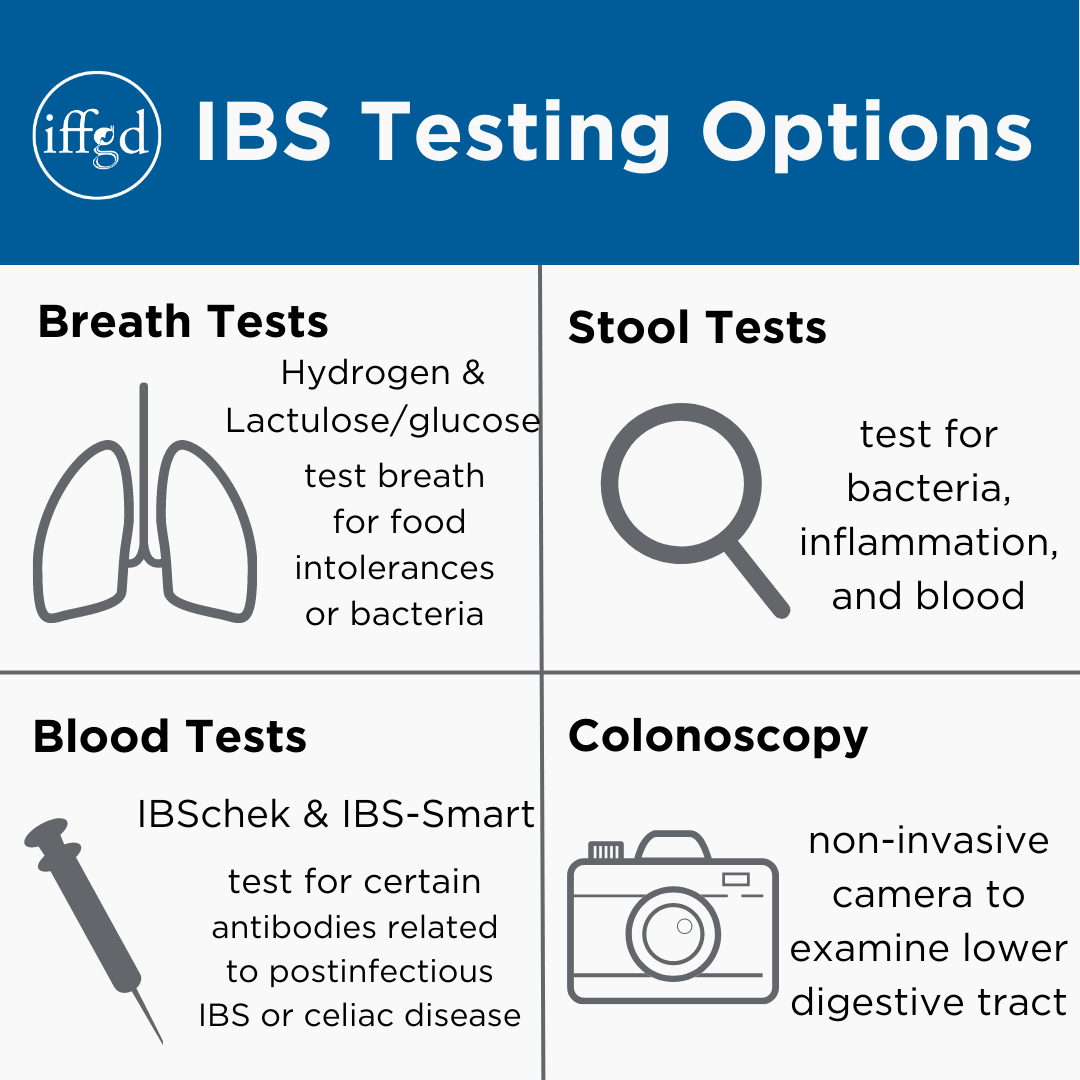Types of Testing in IBS

Using a positive diagnostic strategy with minimal testing can reduce the time to begin proper treatment for IBS and improve overall outcomes. However, sometimes tests will be used to rule out other possible causes, especially in those with mostly diarrhea, or diarrhea mixed with constipation.
Blood Testing
There are two blood tests designed to assist with the diagnosis of IBS. They are IBSchek and IBS-Smart. Both are blood tests designed to assist in the diagnosis of irritable bowel syndrome with predominant diarrhea (IBS-D) or with mixed bowel habits (IBS-M) in adults.
They do this by testing for certain antibodies thought to be related to IBS developed after a GI infection (postinfectious IBS). Some research studies have showed that patients with IBS-D or IBS-M have high positivity rates of these antibodies when compared with healthy patients. However, these antibodies do not detect IBS in everyone, and a negative test does not mean you do not have IBS.
In some cases, a blood test may be used to screen for celiac disease. Celiac disease is a genetic condition of the small intestine that develops in people who are unable to eat gluten (a common ingredient in many foods including grains, wheat, rye, and barley, as well as many processed foods). It causes malabsorption of nutrients and food and results in symptoms similar to those in IBS. Generally, screening for celiac disease with blood tests is recommended in those with irritable bowel syndrome with diarrhea (IBS-D). If the blood test is positive, an upper endoscopy should be performed to examine and biopsy the small intestine to confirm the diagnosis. The healthcare provider may also check for inflammatory bowel disease (IBD) by testing to see if
Stool Tests
The most common reasons to test a sample of a bowel movement is to check for
- bacterial infections (specifically Giardia- a tiny parasitic germ that causes giardadsis (a disease causing diarrhea). Giardia can be found on surfaces, in soil, food, or water contaminated with feces (poop) from infected people or animals. This infection should be only considered in patients with exposure or risk factors.),
- inflammation (testing for fecal calprotectin and lactoferrin is used to see if there is inflammation in the gastrointestinal tract. This helps to determine if someone has inflammatory bowel disease (IBD) and/or irritable bowel syndrome (IBS).
- blood in the BM (a positive fecal blood test indicates that there is bleeding somewhere in the digestive system and will require further testing to determine where it is coming from).
Sigmoidoscopy or Colonoscopy
Both a sigmoidoscopy and a colonoscopy allow the healthcare provider to see inside the lower portions of the GI tracts. Both are simple tests that so not involve cutting into the body.
During a sigmoidoscopy, the healthcare provider uses a tube to look at the rectum and lower part of the large intestine or colon. The tube can either hard or soft and can sometimes be done in the healthcare providers office during a visit.
During a colonoscopy, the healthcare provider will use a long flexible tube called an endoscope. This tube has a camera and light on the end. This tool allows your physician to see inside your GI tract to examines the lower portion of the GI tract. This flexible tube is inserted through the anus, into the rectum and large intestine. This test cannot be done during a office visit and requires a complete emptying of the bowels beforehand.
Sigmoidoscopy and colonoscopy should be performed only when alarm signs such as rectal bleeding or weight loss are present or as part of routine diagnostic screening for colon cancer after age 45.
Anorectal Manometry
This test measures pelvic floor function, specifically anal and rectal pressures by inserting a small tube with pressure sensors on it through the anus and into the rectum. Patients will be asked to perform a few maneuvers, such as squeezing and/or trying to push out a BM. This will record the pressure changes and natural muscle reflexes in the anus and rectum. There is a balloon mounted at the tip of the tube that will be inflated to check rectal sensation and urgency. A balloon expulsion test may also be performed. A small balloon is inflated with 50 milliliters of water and individuals are asked to attempt to pass the balloon (simulating a bowel movement). Anorectal manometry is safe, painless, and does not require sedation.
Miscellaneous Tests
Other tests may be done depending on specific aspects of an individual’s illness, especially atypical symptoms or alarm signs. However, many people do not require these other tests.
| Test | Purpose |
|---|---|
| GI Transit Study | This test may be used in those who experience mostly constipation as it measures how fast (or slow) contents move through the GI tract. |
| Hydrogen Breath test | This is used to detect specific carbohydrate intolerances, such as lactose, fructose, or sucrose. A positive study allows diet changes and/or medications to help with symptoms. |
| Lactulose/ glucose breath test | This is used to detect an overgrowth of bacteria in the intestines. Your body requires a certain balance of bacteria to maintain healthy digestion. When there are too many bacteria, it is sometimes called small intestinal bacterial overgrowth (SIBO). SIBO and IBS share many symptoms, and you can have both. |
Learn more about treatments for IBS
Adapted from IFFGD Publication #163: Current Approach to the Diagnosis of Irritable Bowel Syndrome By: Leila Neshatian, MD, MSc, Clinical Associate Professor, Stanford University School of Medicine and Sarvee Moosavi, MD, FRCPC, Clinical Assistant Professor Neurogastroenterology and GI Motility, University of British Columbia, Vancouver General Hospital, St. Paul’s Hospital GI Motility Lab Edited by: Darren M. Brenner, MD, Professor of Medicine and Surgery, Northwestern University – Feinberg School of Medicine, Chicago, Illinois









